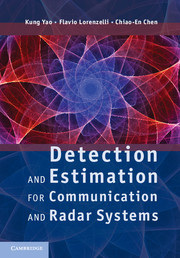Book contents
- Frontmatter
- Dedication
- Contents
- Preface
- 1 Introduction and motivation to detection and estimation
- 2 Review of probability and random processes
- 3 Hypothesis testing
- 4 Detection of known binary deterministic signals in Gaussian noises
- 5 M-ary detection and classification of deterministic signals
- 6 Non-coherent detection in communication and radar systems
- 7 Parameter estimation
- 8 Analytical and simulation methods for system performance analysis
- Index
3 - Hypothesis testing
Published online by Cambridge University Press: 05 July 2013
- Frontmatter
- Dedication
- Contents
- Preface
- 1 Introduction and motivation to detection and estimation
- 2 Review of probability and random processes
- 3 Hypothesis testing
- 4 Detection of known binary deterministic signals in Gaussian noises
- 5 M-ary detection and classification of deterministic signals
- 6 Non-coherent detection in communication and radar systems
- 7 Parameter estimation
- 8 Analytical and simulation methods for system performance analysis
- Index
Summary
Hypothesis testing is a concept originated in statistics by Fisher [1] and Neyman–Pearson [2] and forms the basis of detection of signals in noises in communication and radar systems.
Simple hypothesis testing
Suppose we measure the outcome of a real-valued r.v. X. This r.v. can come from two pdf's associated with the hypotheses, H0 or H1. Under H0, the conditional probability of X is denoted by p0(x) = p(x∣H0), −∞ < x < ∞, and under H1, the conditional probability of X is denoted by p1(x) = p(x|H1), − ∞ < x < ∞. This hypothesis is called “simple” if the two conditional pdf's are fully known (i.e., there are no unknown parameters in these two functions). From the observed x value (which is a realization of the r.v. X), we want to find a strategy to decide on H0 or H1 in some optimum statistical manner.
Example 3.1 The binary hypothesis problem in deciding between H0 or H1 is ideally suited to model the radar problem in which the hypothesis H0 is associated with the absence of a target and the hypothesis H1 is associated with the presence of a target. In a binary hypothesis problem, there are four possible states, whether H0 or H1 is true and whether the decision is to declare H0 or to declare H1. Table 3.1 summarizes these four states and the associated names and probabilities.
- Type
- Chapter
- Information
- Publisher: Cambridge University PressPrint publication year: 2013



